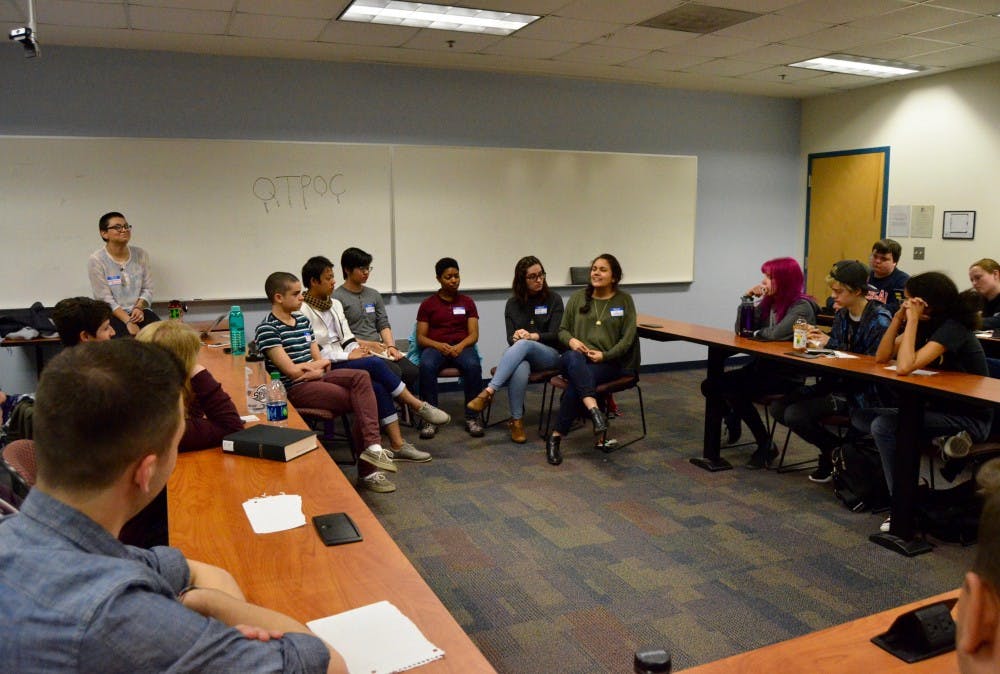As part of AU Queers & Allies LGBTQ+ Week, the Queer and Trans People of Color (QTPOC) community gathered on April 12 to hear six panelists discuss the intersections of their racial and sexual identities, coming out and barriers they have faced at AU. The week of programming has focused on raising awareness of and celebrating queerness on campus, culminating in Pride Prom tonight at 9 p.m.
Moderated by student community coordinators Allegra Kartha and Kristin Thompson, the panel featured students of various sexual and racial backgrounds, including exchange student Hein Htwe Maung, Cassidy Sadatian ‘18, Marissa Scott ‘19, Jojo Leung ‘18, Liliana Ascencio ‘18 and fellow coordinator Jeffrey Guzmán ‘19.
Titled “Conversations on Queerness in Ethnic/Racial Communities,” Kartha said the event matched the group’s goal of highlighting the unique experiences of queer and trans students of color and giving them a safe space to tell their stories.
“Queerness looks really different in black communities than it does in Latinx [non-binary term that replaces Latino/Latina] communities,” Kartha said in an interview. “It doesn’t work the same, so I think this event opens that up for people. People can learn about, ‘how can I be more inclusive of queer identities? How can I be more inclusive of QTPOC?’”
Maung, who is studying marketing at AU, spoke extensively about his experiences as a gay man in Burma, where he has faced harassment and discrimination that has repeatedly turned violent. According to Maung, he was kicked out of boarding school for his sexuality and physically attacked by family members.
“When he found out, my dad would beat me up with a belt for a month, and my mom wouldn’t stop crying,” Maung said. “My elder brother...when he got drunk, one time, he came after me with a knife because he said he was embarrassed, [saying] that I’m an embarrassment to the whole family.”
As the students discussed how they handled telling their friends and family about their sexual identity, Leung, a sophomore in the College of Arts and Sciences, added that as an Asian-American, coming out is particularly hard.
“Coming out is a white narrative,” Leung said. “The collectivist nature of...my culture, being Asian-American, not to say it isn’t friendly, but to have an individualist moment of ‘I’m here, I’m queer and I’m ready to win’ is very Western...Coming out is very difficult because if I had to choose between my family and my individuality, I don’t know if I can choose.”
Several panelists cited professors and other students as barriers to expressing their identities on campus. Guzmán, a freshman in the School of Communication, said he was excited to come to AU last summer but has since been disappointed by other students’ comments on race and sexuality.
“I feel like a lot of people on campus are fake-woke,” Guzmán said. “They like to bandwagon on...social media trends. My wall was flooded on the day the Supreme Court decision came out, but they’re oblivious to the actual issues.”
Ascencio, a sophomore in CAS, advocated for on-campus counselors to help other students break down internalized homophobia and transphobia, a problem she said she sees in students who want to be “accepting” but often fail to realize their own shortcomings.
“I wish there were spaces I could be my whole self, not that I can’t be myself with some people, but I wish there were spaces where I could be both of my identities,” Ascencio told the group. “I feel like I’m always fighting for the race card. I need to address one problem at a time. Some days you can’t fight every battle. So anyone who’s here, fight those battles.”





